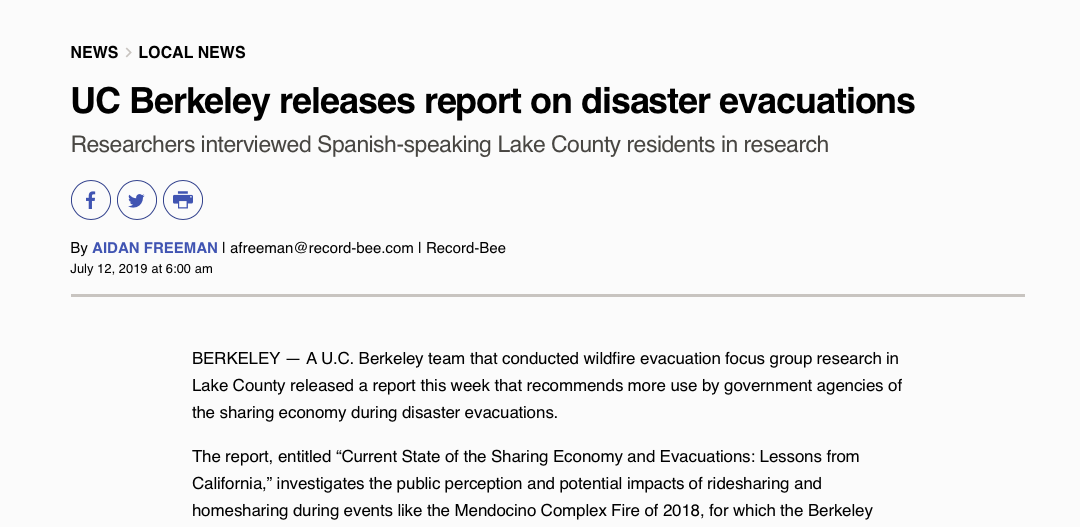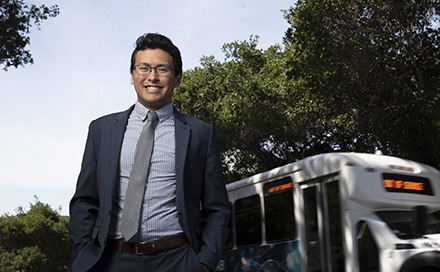by Innovative Mobility Research | Apr 27, 2021 |
Authors: Stephen Wong, PhD, Jacquelyn Broader, Adam Cohen, Susan Shahen, PhD Date: February 1, 2021 Abstract: Evacuation and response plans require thoughtful strategies that build mandatory evacuation order compliance, reduce vehicular congestion, and increase social equity for disadvantaged populations. However, the novel coronavirus (COVID-19) pandemic coincided with a series of devastating disasters in 2020 that have required mass evacuations, leading to several new compounding effects (i.e., “double the trouble”). Strategies typically used in evacuations (e.g., high-capacity vehicles and public congregate shelters) and movements of people (e.g., evacuees, first responders, and volunteers) could increase the risk of COVID-19 spread and exposure. Moreover, disadvantaged populations who are already disproportionately impacted by disasters and COVID-19 separately could face new challenges in dual crises. To address these new and growing challenges, this playbook employs insights from case studies (n=12), survey data of individuals impacted by public safety power shutoff (PSPS) events (n=210), and expert interviews (n=17). Using these data, the playbook: (i) shares recent lessons learned from case studies of compounding disasters during the pandemic; (ii) offers a primer for the potential compounding impact of PSPS events and disasters; (iii) highlights current considerations in the emergency management and evacuation fields; and (iv) provides a series of actionable checklists to address COVID-19 and a compounding disaster. Relevant stakeholders in disasters and evacuations that should use this playbook include public agencies, first responders, community-based organizations, non-governmental organizations, private mobility companies, public health facilities, and other evacuation stakeholders. The playbook can be adapted for multiple hazards, different local contexts, various agency types, and future pandemics. View...
by Innovative Mobility Research | Dec 11, 2020 |
Author: Stephen Wong Date: October 1, 2020 Abstract: Evacuations are a primary transportation strategy to protect populations from natural and humanmade disasters. Recent evacuations, particularly from hurricanes and wildfires, have exposed three critical evacuation challenges: 1) persistent evacuation non-compliance to mandatory evacuation orders; 2) poor transportation response, leading to heavy congestion, slow evacuation clearance times, and high evacuee risk; and 3) minimal attention in ensuring all populations, especially those most vulnerable, have transportation and shelter. With ongoing climate change and increasing land development and population growth in high-risk areas, these evacuation challenges will only grow in size, frequency, and complexity, further straining transportation response in disaster situations. View...
by Innovative Mobility Research | Oct 22, 2020 |
Authors: Stephen Wong, Jacquelyn Broader, Susan Shaheen, PhD Date: October 1, 2020 Abstract: Well planned and coordinated evacuations are critical to saving lives during natural disasters (e.g., hurricanes, wildfires) and human-caused disasters (e.g., chemical spills, terrorism). To complicate matters, recent wildfires in the western United States (U.S.) and multiple hurricanes in the Gulf Coast have coincided with the novel coronavirus (COVID-19) pandemic. As of mid-October 2020, the COVID-19 pandemic has led to over 7.9 million positive cases and over 217,000 deaths in the U.S. alone. Stay-at-home orders and social distancing measures that were introduced to address COVID-19 may conflict with evacuation orders that employ high-capacity evacuation vehicles (e.g., buses), congregate shelters, and resource sharing (e.g., carpools, relief supplies, food distribution). Evacuations may become spreading events for the virus if destinations (or origins) have high trans-mission rates, compounding the risks of COVID-19 and the disaster. The COVID-19 pandemic has also highlighted the risks to vulnerable populations, who may have limited mobility and lack access to essentials such as jobs, food, healthcare, and COVID-19 testing. View...

by Innovative Mobility Research | Jul 15, 2019 |
Aidan Freeman July 12, 2019 A U.C. Berkeley team that conducted wildfire evacuation focus group research in Lake County released a report this week that recommends more use by government agencies of the sharing economy during disaster evacuations. The report, entitled “Current State of the Sharing Economy and Evacuations: Lessons from California,” investigates the public perception and potential impacts of ridesharing and homesharing during events like the Mendocino Complex Fire of 2018, for which the Berkeley team hosted a Spanish-speaking focus group to study that demographic’s stance on sharing homes or vehicles during emergencies. The Berkeley study’s primary authors, Stephen Wong and Susan Shaheen, write that “In many evacuations including wildfire evacuations, public agencies often do not have enough resources to evacuate and shelter all citizens.” “Consequently,” they continue, “we propose that the sharing economy, through private companies and/or private citizens, could be leveraged in disasters for transportation and sheltering resources.” The need for more efficient means of transport during and emergency evacuation was made horrifically clear during the Camp Fire in November when thousands of Paradise residents attempted to flee the approaching fire at once along just a few viable exit routes, resulting in congestion and many casualties. In Lake County, roughly 19,000 residents were evacuated during the Mendocino Complex Fire last year. But in rural counties like Lake, Wong noted in an interview, the sharing economy manifests differently than it does in urban areas. Tech-based ridesharing companies like Uber and Lyft are hardly present in Lake County at all, and while homeshares through Airbnb are present here, most of the subjects in the Berkeley focus group were...

by Innovative Mobility Research | Jun 20, 2019 |
Linda Vu June 19, 2019 In the past few years, devastating California wildfires have forced more than half a million people to evacuate their homes. In many cases, local government agencies did not have enough resources to transport and shelter all of the evacuees, especially vulnerable populations like the elderly and disabled. Meanwhile those who could afford it, secured hotel rooms or Airbnbs and evacuated with their cars. Now, researchers at UC Berkeley are suggesting that emergency management agencies and local relief organizations partner with companies in the sharing economy — including Airbnb, Lyft and Uber — and private citizens, to ensure equity in evacuations. They described their ideas in a first-of-its-kind policy brief published today. “Private sharing economy companies have already acted in California disasters and I’ve found that private citizens are moderately willing to share their own resources in disaster relief situations, especially transportation,” said Stephen Wong, a transportation engineering Ph.D. candidate in UC Berkeley’s Transportation Sustainability Research Center. “Local organizations and emergency response agencies should… Read the full article here: How can companies like Airbnb, Lyft or Uber help in...


